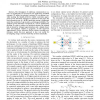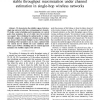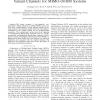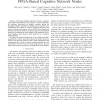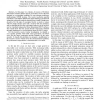113
Voted
GLOBECOM
2008
IEEE
15 years 7 months ago
2008
IEEE
—In this paper, with the cross-layer design principle, a novel cooperative triple busy tone multiple access (CTBTMA) scheme is proposed for wireless networks to achieve cooperati...
99
Voted
GLOBECOM
2008
IEEE
15 years 7 months ago
2008
IEEE
—We propose a non-coherent receiver for the fixed detect-and-forward relay channel and derive a closed-form tight upper bound on its bit error probability in Rayleigh fading cha...
125
Voted
GLOBECOM
2008
IEEE
15 years 7 months ago
2008
IEEE
Abstract—The throughput of multi-hop communication systems can significantly be increased by the application of MIMO concepts. To utilize the physical resources in an efficient...
131
Voted
GLOBECOM
2008
IEEE
15 years 7 months ago
2008
IEEE
—We characterize the stability region of wireless, single-hop networks with time-varying imperfect channels. We define a joint scheduling and transmission rate control policy th...
GLOBECOM
2009
IEEE
15 years 8 months ago
2009
IEEE
Abstract—This paper proposes a low-complexity twodimensional channel estimator for MIMO-OFDM systems derived from a time-frequency variant channel estimator previously proposed. ...
79
Voted
GLOBECOM
2009
IEEE
15 years 8 months ago
2009
IEEE
—This paper identifies important features a cognitive radio framework should provide, namely a virtual architecture ware abstraction, an adaptive run-time system for managing co...
113
Voted
GLOBECOM
2009
IEEE
15 years 8 months ago
2009
IEEE
— In this paper we evaluate, by means of Extrinsic Information Transfer (EXIT) charts, an iterative receiver that has emerged as a promising candidate for non-coherent multi-user...
GLOBECOM
2009
IEEE
15 years 8 months ago
2009
IEEE
108
Voted
GLOBECOM
2009
IEEE
15 years 8 months ago
2009
IEEE
— We study Bayesian detection based cognitive sensing and analyze its impact on the capacity in various cases of location information. In a network of one primary and one cogniti...
68
Voted
GLOBECOM
2009
IEEE
15 years 8 months ago
2009
IEEE
—Initialization is an indispensable process for wireless sensor networks since newly deployed sensors lack a reliable infrastructure for communication. Many efforts have been mad...

